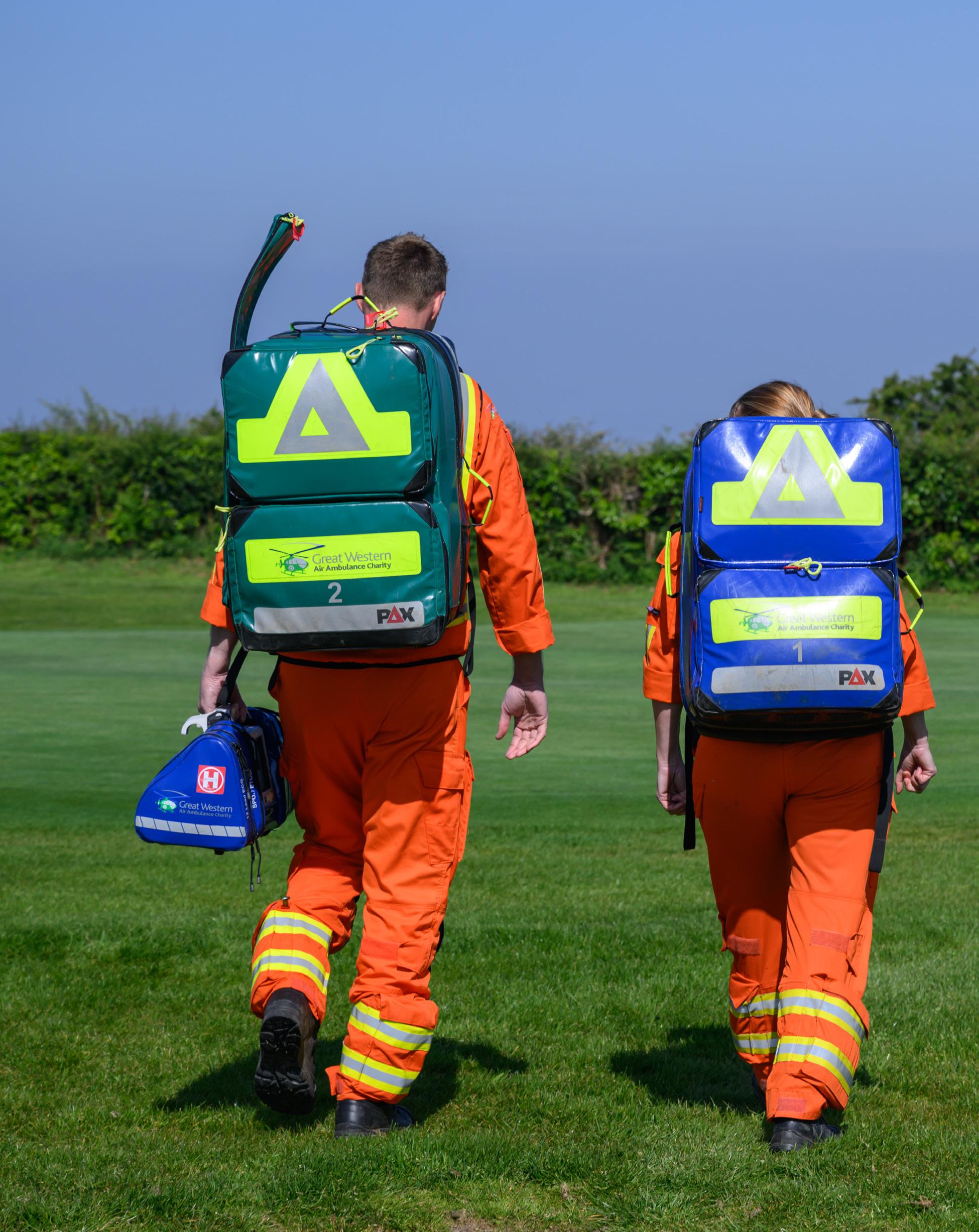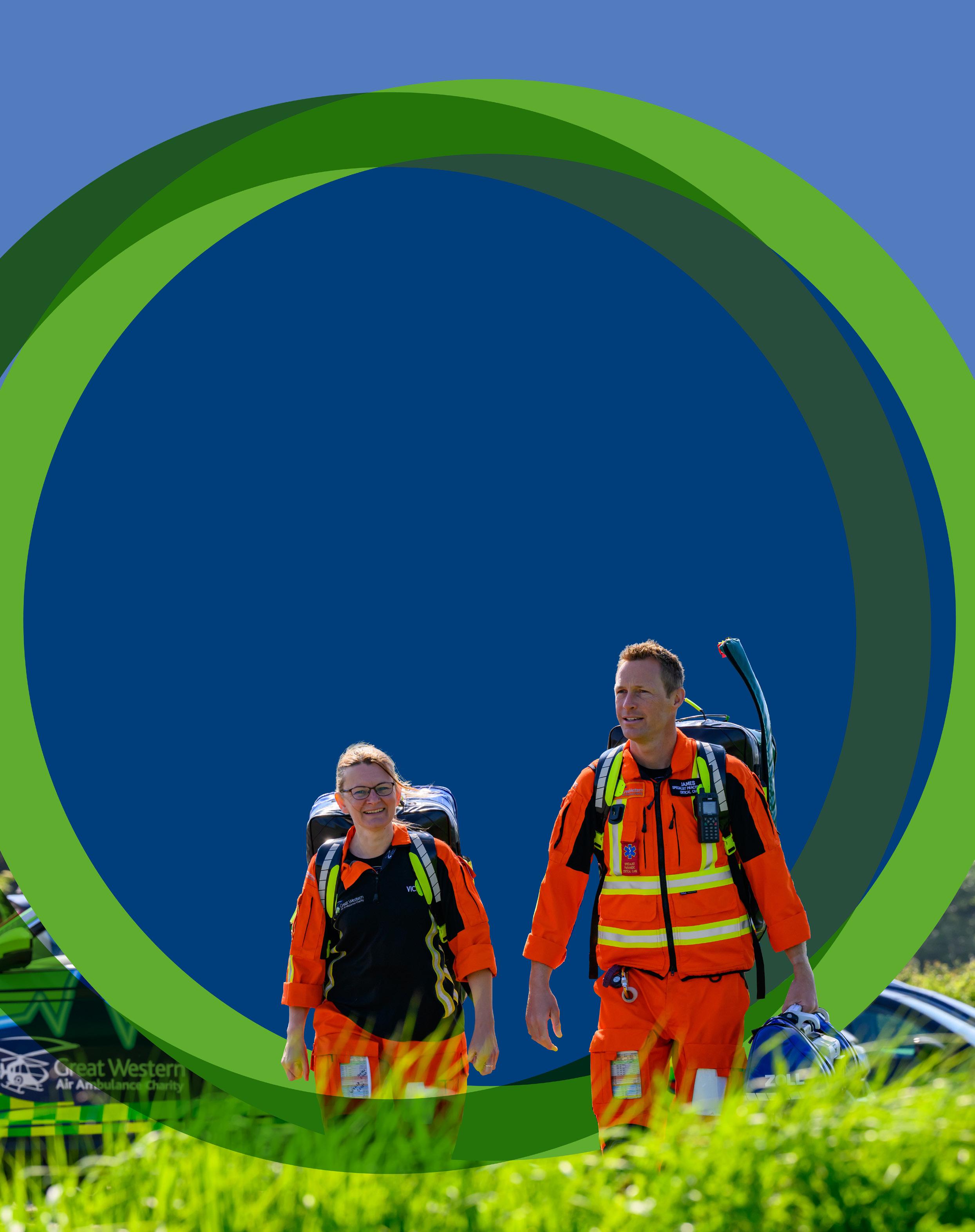
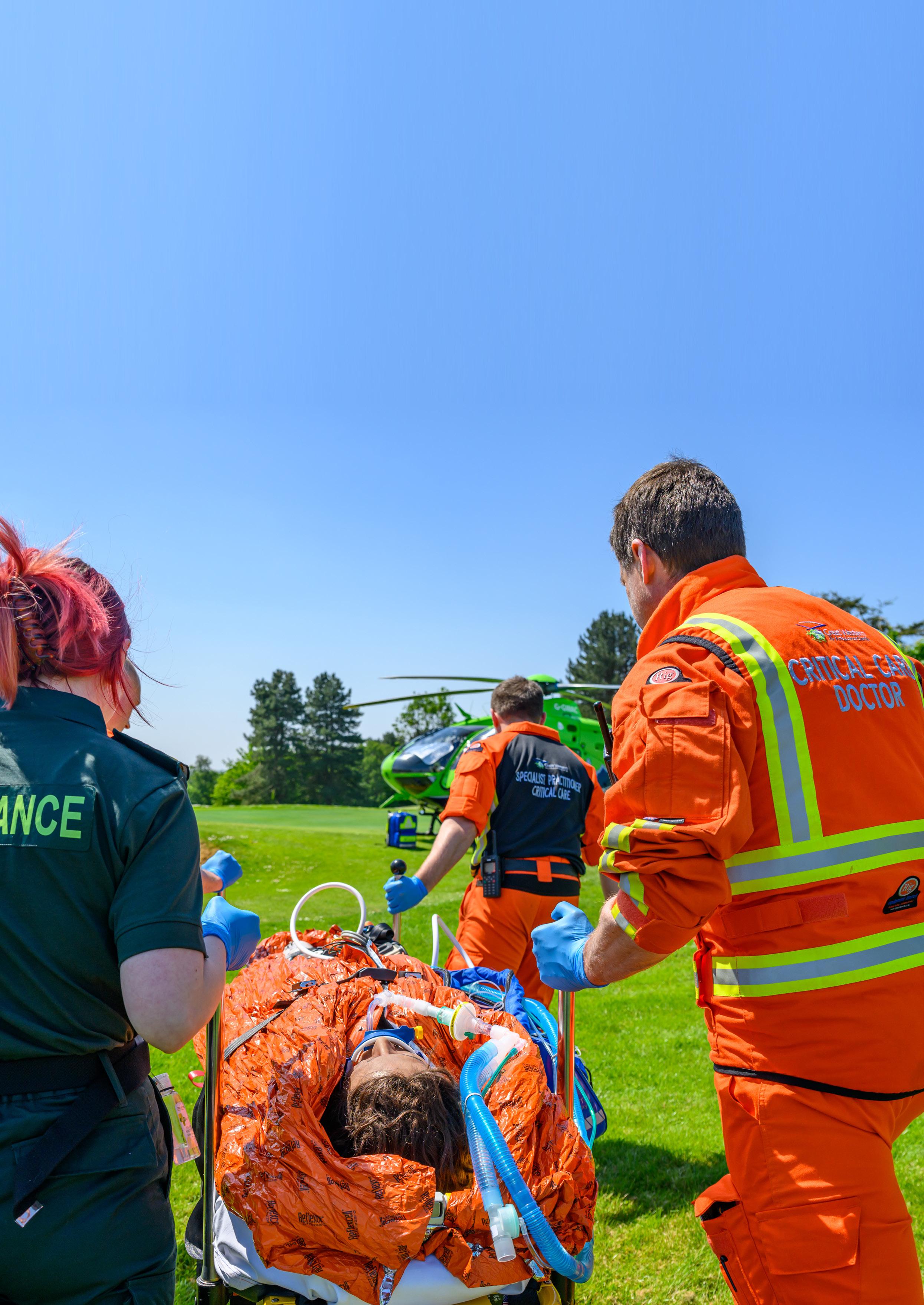



Great Western Air Ambulance Charity’s Purpose is to be there for people who need us – people who are experiencing a life-changing illness or injury and need the best care as soon as possible. We have specialist clinicians who are experts in lifesaving treatment, and a dedicated team supporting them. But we can only carry out this work because of the generosity of our local communities who we rely on to support us, year after year. For this we are grateful.
Our Values guide everything we do.

This is the core of what we do, but we know we can do even better. We plan to invest in the development of our clinicians and the people they work with to provide the best care for patients. We want to make sure we are dispatched to the patients who can benefit most from our expertise, get more involved in research and become more evidence and data driven, so we know what we do really makes an impact. We want to be there for anyone who needs us, and make sure that everyone can benefit equitably from our expertise.
Our people are our greatest resource – we rely on them to deliver our service, raise the funds we need and run the charity, and we need to support them to do this. We want to improve the wellbeing support available to our team, formalise development pathways so people can enhance their skills and help our doctors to balance working with GWAAC with their other commitments. We also want to review our recruitment processes and develop our culture so we can attract and retain the best people, be genuinely inclusive and remove the barriers between our clinical and non-clinical teams.
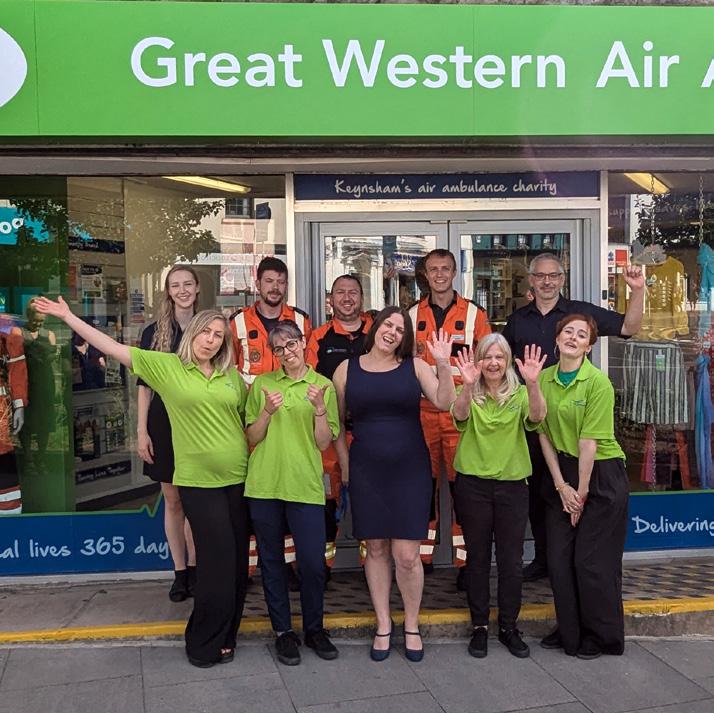
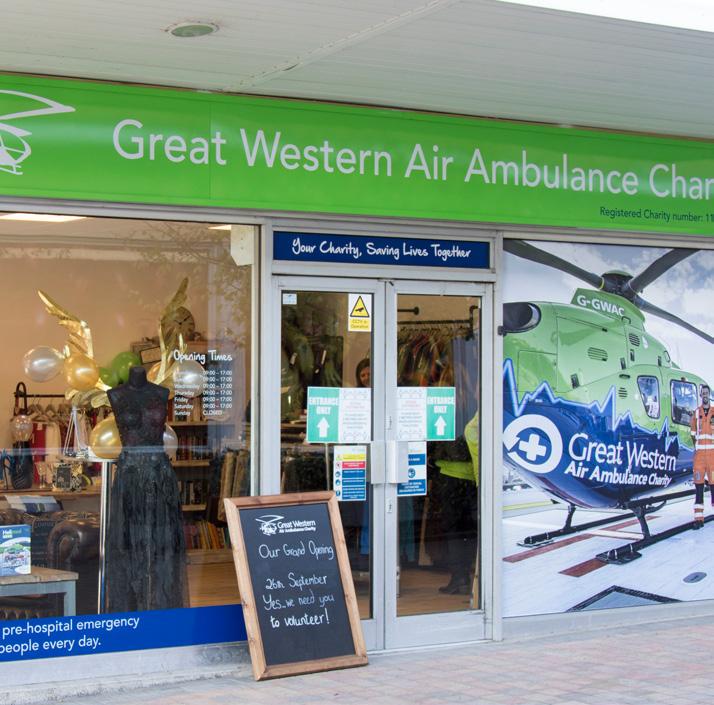
Our team and our supporters rightly expect that we behave ethically in everything we do. We pride ourselves on our Great Western Hearts CPR and Defib projects, but want to expand their reach, and we are making good progress towards being more environmentally sustainable, but there is still a long way to go. We want to engage all our people in helping us reach our aims in these areas, in removing barriers that diverse groups might experience when in contact with us and in enhancing the support we offer to former patients and bereaved families.

Put simply, we need more money so we can be there for anyone experiencing a life-changing or life-threatening event, to train more people in CPR, to provide more defibrillators, to support former patients and bereaved families and to continue providing the best available clinical care. We need people to know who we are and why we need their support, to raise more funds through legacies, regular gifts and our lottery, and to benefit from time given by more volunteers. We will replace our database with a modern system to help us manage our external relationships, increase our visibility, review our fundraising activities, generate more money from commercial activities and make sure we are providing real value to local communities.
Our supporters trust us with their donations, and we need to make sure we continue to use them effectively and efficiently to provide our service and generate additional funds. We want to increase our focus on using evidence and evaluation to inform and improve our work, continue to professionalise our supporting systems and use new technology where appropriate. We also want to collaborate more with other air ambulances and relevant organisations, so we can use our resources jointly to have a bigger impact. We plan to recruit new Trustees to our Board, bringing in different experiences and skills to improve our governance.
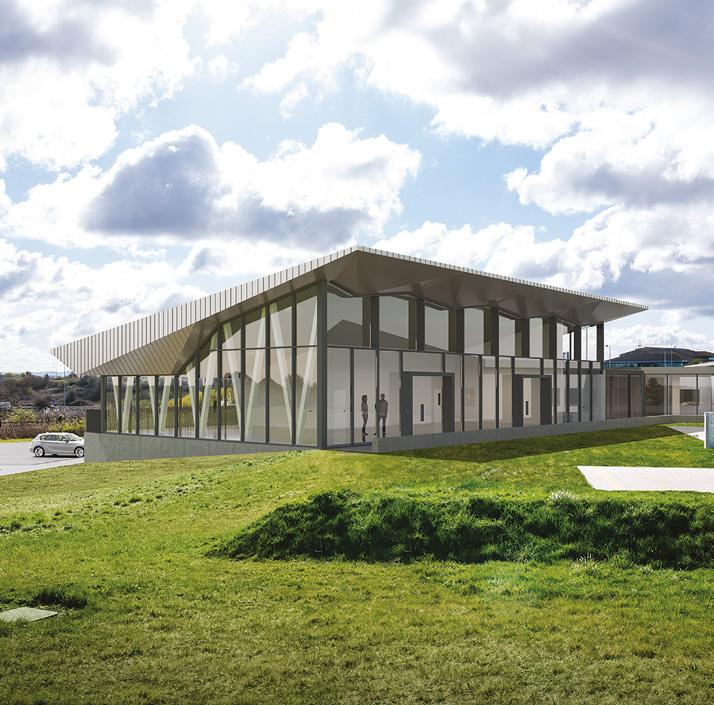

Underpinning our Ambitions is the creation of a Mission Support Centre at our airbase. This will be crucial in helping us to improve our people’s wellbeing, join our clinical and non-clinical teams together, enhance our support for former patients and bereaved families, deliver CPR and clinical training to the public and other stakeholders and provide a hub for our ever-increasing fundraising and engagement activities.
Because a life-changing illness or injury could happen to you, anywhere, anytime, and you deserve the best care, as soon as possible.
Because we have amazing people with extraordinary skills, all committed to saving lives in our local communities, who can help you when you need us.
Because, just as GWAAC’s people care for our communities, you care for them – your generosity keeps GWAAC flying, and keeps us saving lives.

a
Great Western Air Ambulance Charity is an integral part of the South West’s emergency response but is funded by local people rather than the NHS or Government.
We are not a transport service. Our team of expert clinicians are called to treat people who are experiencing a lifethreatening or life-changing incident, whether it be an accident or a medical event. Our crew bring the Emergency Department to the patient, wherever they are, and some elements of an intensive care unit too. GWAAC delivers lifesaving care, that keeps families together for longer.
Our Critical Care Team utilise their skills, equipment and specialist drugs and make decisions about what is best for each patient. This may involve transporting the patient to hospital in the helicopter, but more often a land ambulance is used and the GWAAC crew travel with the patient via road. In most cases, the patient is taken to one of the South West’s major trauma or cardiac centres in Bristol.
Although our crew save many lives, they are most effective when working in partnership with others. GWAAC leads many projects designed to strengthen this ‘chain of survival’ for people needing urgent care, including:
• Teaching the importance of immediate CPR and defibrillation in cardiac arrests, giving people the skills and confidence to step in
• Identifying priority locations for defibrillators and working with communities to put these in place
• Working with land ambulance crews to enhance their skills and help them identify when to call GWAAC and how to help whilst waiting for our crew and when working together
• Sharing knowledge with other organisations, such as Search and Rescue, the ambulance service’s Hazardous Area Response Team, and Fire and Rescue



Our four Values underpin all our decision making and all the ways we behave. It is the common standard that we expect of all our staff, crew and volunteers. It’s what sets us apart from others, and what people recognise as being the core of GWAAC.
We are mindful of how others are feeling and we do something to help. We put people first.
We give a suitable amount of our energy and time to the person in front of us. We show sensitivity and consider their needs, taking a personal approach to support them.
It’s our passion that drives us but we make the best decisions when we look at the bigger picture together.
It’s the way we feel about what we do that unites us. We throw ourselves into our work to deliver results, persisting in the face of adversity. While we always push to do our individual best, we adapt to fit the situation together.
We are
We’re aware of and embrace innovations but we won’t adopt them without good reason.
We challenge ways of thinking. We ask brave questions, try new things where possible and learn from mistakes, because if we prohibit failure we restrict growth.
We bring the right people together to solve problems and achieve great things.
We work together and understand that we each have a role to play in our team. We value each other’s experiences, seek each other’s perspectives and recognise each other’s strengths. We offer support and give the best of ourselves. And we do it all to help other people.
Over the next five years, we will work towards achieving our purpose by pursuing our Ambitions. Under each one there are several steps we will need to take to meet it.
Many of our plans are dependent on funding, or they might rely on another organisation to help us, or another project to be completed first. As a relatively small organisation, we also want to be agile, responsive and able to make the most of opportunities we might not have predicted.
So, things might change a bit. But these are the Values and Ambitions that will guide all our work.
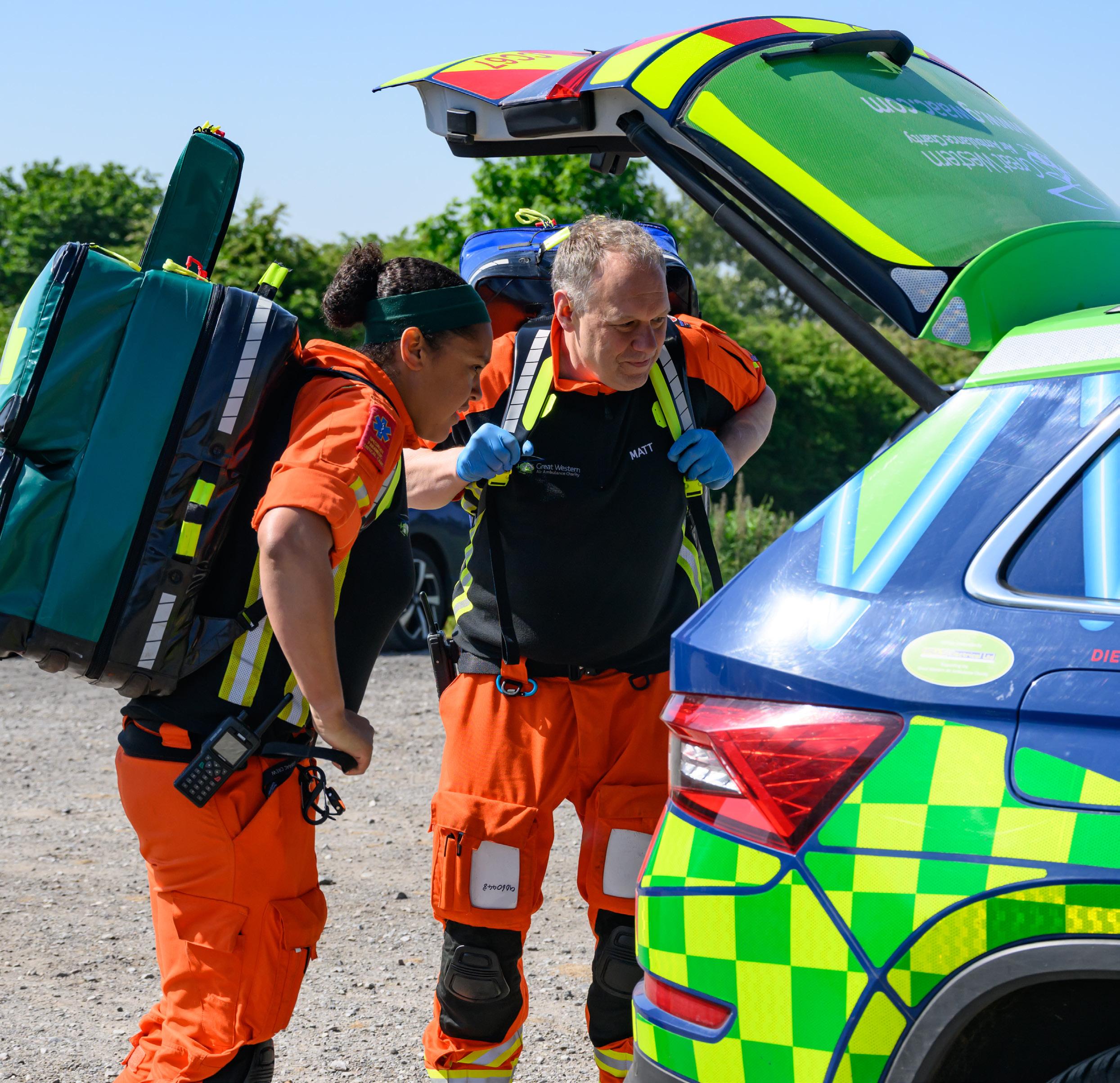
We are COMPASSIONATE
Ambition One: Deliver clinical and operational excellence
We are DEDICATED
Ambition Six: Create a Mission Support Centre OUR PURPOSE
Ambition Two: Our team is the best it can be
Ambition Five: Be an excellent organisation
To be there for people who need us – people who are experiencing a life-changing illness or injury and need the best care as soon as possible
Ambition Three: Be socially and environmentally responsible
We are CURIOUS
Ambition Four: Be the charity that local people choose to support
We are COLLABORATIVE
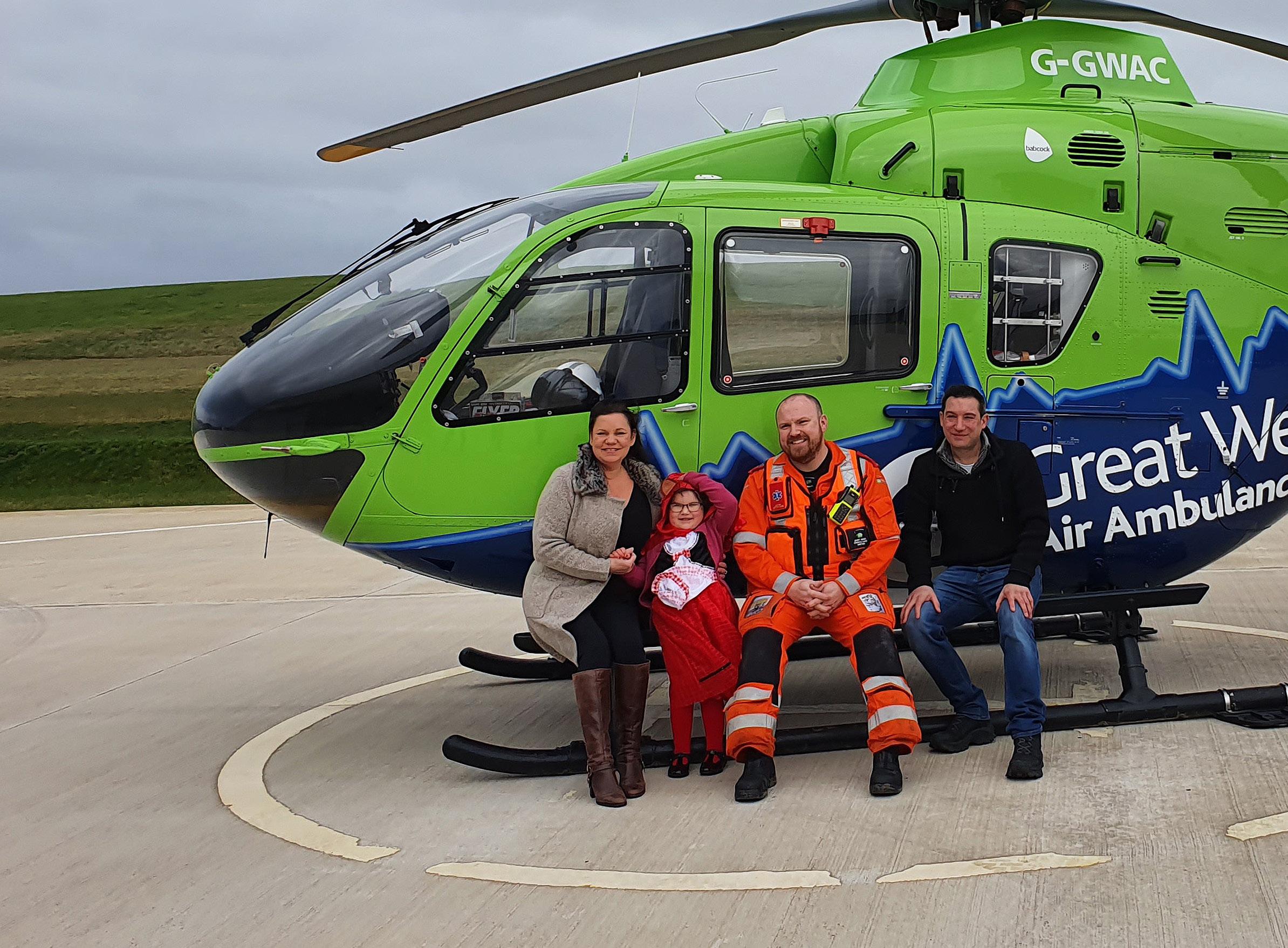
Parents Niky and Ryan’s lives were turned upside down on the morning of 31 October 2019, as any parents’ worst nightmare became a reality. Their four-year-old daughter, Jasmine, had stopped breathing –she was unconscious, suffering a respiratory arrest and in need of emergency care, fast.
GWAAC’s Critical Care Team were dispatched to the incident in Gloucestershire with Critical Care Doctors, Scott and Andrew, and Specialist Paramedic in Critical Care, Jack, arriving in less than 20 minutes.
Jasmine’s mum, Niky, recalls: “By the time your team arrived I was crumbling, at a loss of what to do or what to expect. I will never forget Scott, Andrew and Jack’s reassurances to me. I knew we now also had Emergency Doctors onsite, trained in Paediatrics, and they had her, they had
‘this’. I felt complete trust in them. During the worst, most horrific episode that any parent could be in, I felt safe.”
Niky continued: “I will remember Scott talking to me for the rest of my life. The collaborative approach, communication, safety, checking and re-checking during fast paced treatment and decision making between teams was beyond what could be called perfect. Everything was co-ordinated and undertaken to ensure that Jasmine was alive, that she was stable and safe – and that she remained so.”
Jasmine was very unwell – she had stopped breathing and needed an emergency anaesthesia. Our crew put Jasmine into an induced coma, taking over her breathing and preventing any further complications, before airlifting her to Bristol Royal Children’s Hospital.
Jasmine spent almost two months in hospital, where she was diagnosed with a very rare syndrome, ROHHAD – of which there are only 12 cases in the UK and 100 worldwide.
“We hope with the expert team at Bristol Children’s Hospital that we are under, with their innovative ideas and dedication to making a difference that they will make steps forward with prognosis and in education to also help many others. They and we would not have this opportunity without you,” said Niky.
In February 2020, Jasmine was well enough to come along to our base with her family, meeting Critical Care Doctor Scott, and having a tour of the helicopter she was taken to hospital in. The day was an emotional one, not just for Jasmine’s family who got the chance to say thank you –but for our crew, who so rarely hear back or meet their patients. Meeting former patients, like Jasmine, gives the crew a stark reminder of the difference their work makes for families all across the region.
There is not a day that has gone by since where we have not thought of you all. You saved Jasmine’s life, and ours, that day.
Niky said: “I very much hope that if life ever throws anything difficult at you that you can think of people like us, who you have saved, made the ultimate of differences to, and smile through any of it.
For us life could have been over on Halloween. In the most awful, devastating situation you got to us and you took
control. You saved Jasmine and gave her the opportunity to fight on through ROHHAD and to live. To have a life and to enjoy it. To embrace every minute and make a difference. We have no sadness over her diagnosis, only thanks that we are able to be on this journey together –through whatever that may be – and that’s because of you all. We can never thank you all enough for this.”
Jasmine has been described as a “whirlwind of positivity”, taking life each day as it comes and fighting on through her recent diagnosis.
Unfortunately, this wasn’t the only day that Jasmine needed our services. For many, needing an air ambulance crew just once in their lifetime is something no one expects, however Jasmine subsequently experienced another arrest at home and received the care of our Critical Care Team once again. Jasmine continues to battle through her diagnosis, facing each day with strength and a smile, and is responding well to treatment suppressing ROHHAD which will help research for the future.
The whole family is now involved in supporting GWAAC, working on various fundraising initiatives and spreading the word about the work we do. We never ask our former patients to do this, but when they choose to be part of our GWAAC family year after year, it makes us so proud, as well as so grateful.

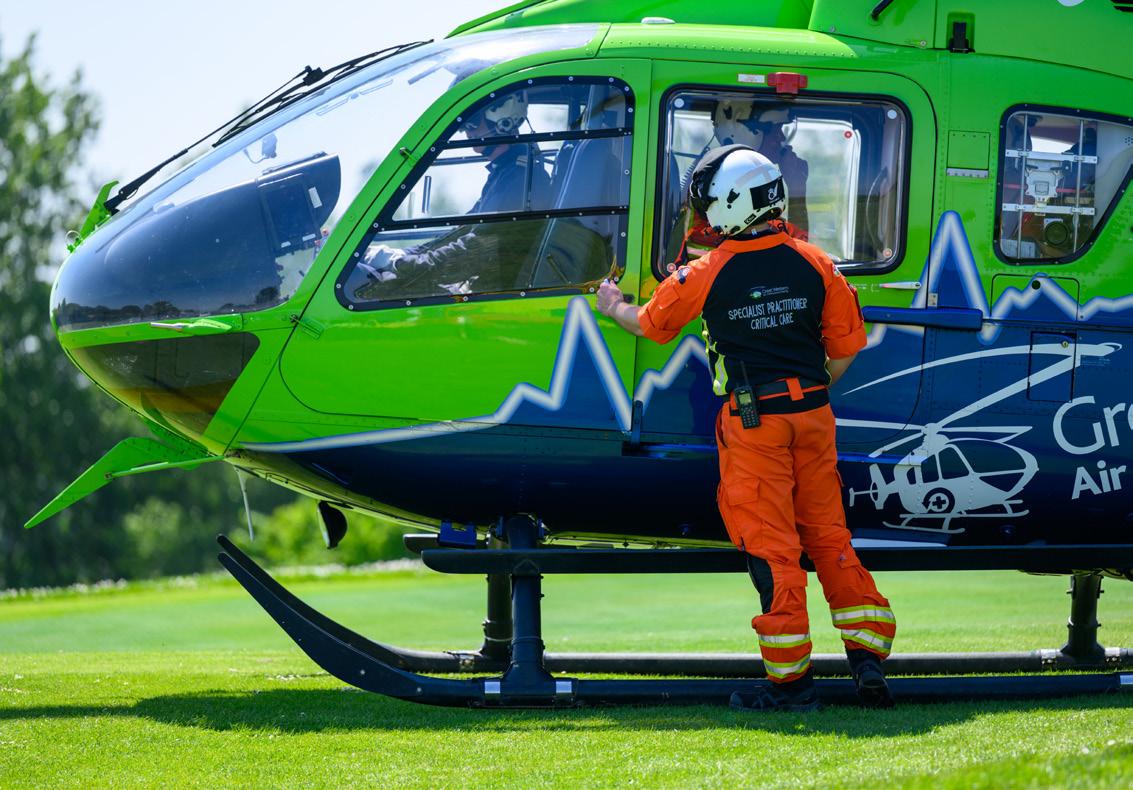


We operate 18 hours a day – by helicopter during the day and by critical care car whenever the helicopter is not available or appropriate. We have a team of around 11 Specialist Paramedics who have GWAAC as their main role, and around 20 Consultant Doctors who work with GWAAC a few times a month.
We can carry out a variety of diagnostic tests and interventions, including blood administration, pre-hospital emergency anaesthetics, ultrasound, blood gas monitoring, amputations and emergency caesarean sections.
We are called to nearly 2,000 patients a year across our operating area, with around 15% of patients being children.
We record our performance in terms of how many patients we are called to and the interventions we carry out. We evaluate how successfully we do certain things, but lack data on the overall outcomes of our service for our patients, and what happens to the patients that we don’t see.
• Invest in the training, development and wellbeing of our crew, to make sure they are performing at their best and able to consistently and reliably deliver sectorleading care to our patients.
• Build relationships with other clinical teams, helping them to develop their skills, quickly identify patients needing critical care, prepare them for our arrival and assist when GWAAC clinicians are present.
• Work with South Western Ambulance Service NHS Foundation Trust to improve the allocation of GWAAC resources to the patients who need us.
• Review our operating hours, crew capacity and capability, resource allocation and critical care car locations to ensure we are there, with the skills needed, for as many patients as possible, as quickly as possible.
• Improve our clinical data, including access to patient outcomes, in order to provide better information about our work and impact. Use this to conduct thorough audits, benchmarking, research and evaluation, and make further improvements for the benefit of our future patients.
• Work in partnership with other clinical teams to trial, evaluate and implement new clinical interventions and operational approaches that improve patient care and help us deliver clinical excellence.
• Understand the differential impact our service might have on different patient groups and take steps to reduce barriers for minority groups in accessing critical care, the quality of care provided, and their eventual outcomes.
• Enhance our airbase to improve training, meeting and welfare space, and provide rest and sleeping facilities.

GWAAC will provide a 24/7 service that is called on for all patients in need of urgent critical care, making a measurable difference to their survival chances and the likelihood of them making a full recovery.


Our clinical team are not directly employed by the charity, and this creates complexity. Our paramedics are employed by SWASFT who are therefore responsible for salaries, conditions and all HR matters. Our doctors are paid through an NHS agency, and they have access to some of the employment support offered by SWASFT, but not full employment rights or benefits. This means that doctors have to work GWAAC shifts around their main, usually full-time, employment, and lack job security. Clinical crew, particularly doctors, would benefit from more visible leadership.
We directly employ around 50 people, almost half of whom support our retail operations. We have an excellent team culture, which is genuinely supportive and values people’s contributions, and is the main reason why people want to work with us, and why they stay. Salaries aim to be just above the market average and terms and conditions are broadly consistent with a charity of our size and means. The main frustrations for our staff team are around inadequate office accommodation and our database.
We prioritise training and personal development based on individual needs, but do not have a formal or articulated approach to this. The relationship between our staff and clinical crew can be disjointed due to geographical separation, shift patterns, different priorities and cultures.
• Ensure that staff and crew have a variety of support options available to them including staff representatives, Mental Health First Aiders, HR expertise, welltrained and equipped managers, and access to third party services such as counselling and physiotherapy.
• Review our recruitment processes and staff management systems to ensure that we attract the best candidates and develop a diverse and highly skilled workforce. Become more actively inclusive, so potential and current staff and crew members feel supported, valued and able to perform at their best.
• Implement formal progression and development pathways, with appropriate resources to implement them, so all of our people feel supported and empowered in their professional development journey, including our managers and leaders, and can achieve excellence in their work.
• Formalise the employment of our doctors, so that they have increased security and protection, and are able to balance their work at GWAAC with their other roles more effectively, allowing them to contribute more.
• Enable our Specialist Paramedics and Advanced Practitioners to expand their clinical skills, so they can bring greater benefits to their patients.
• Promote a whole organisation culture and ethos, increasing the cohesiveness between our staff and crew, through shared events, increased knowledge and understanding of others’ work, and common objectives and values.
• Provide enhanced facilities at the airbase, including a gym, quiet room with natural light, shared meeting and training space, adequate office accommodation, and sleeping and rest areas.
Our staff and crew will have excellent facilities, systems, resources and equipment, which support wellbeing, collaboration, learning, development and progression, productivity, recruitment and retention. People do not choose to leave GWAAC for reasons within our control.
We will have a supportive, transparent and collaborative culture across the whole organisation, working together to help and to hold each other accountable in order to ensure that our individual and combined performance is excellent. This is led by people who have expertise in leadership and management as well as technical experience, but who are supported in their roles by the whole team.

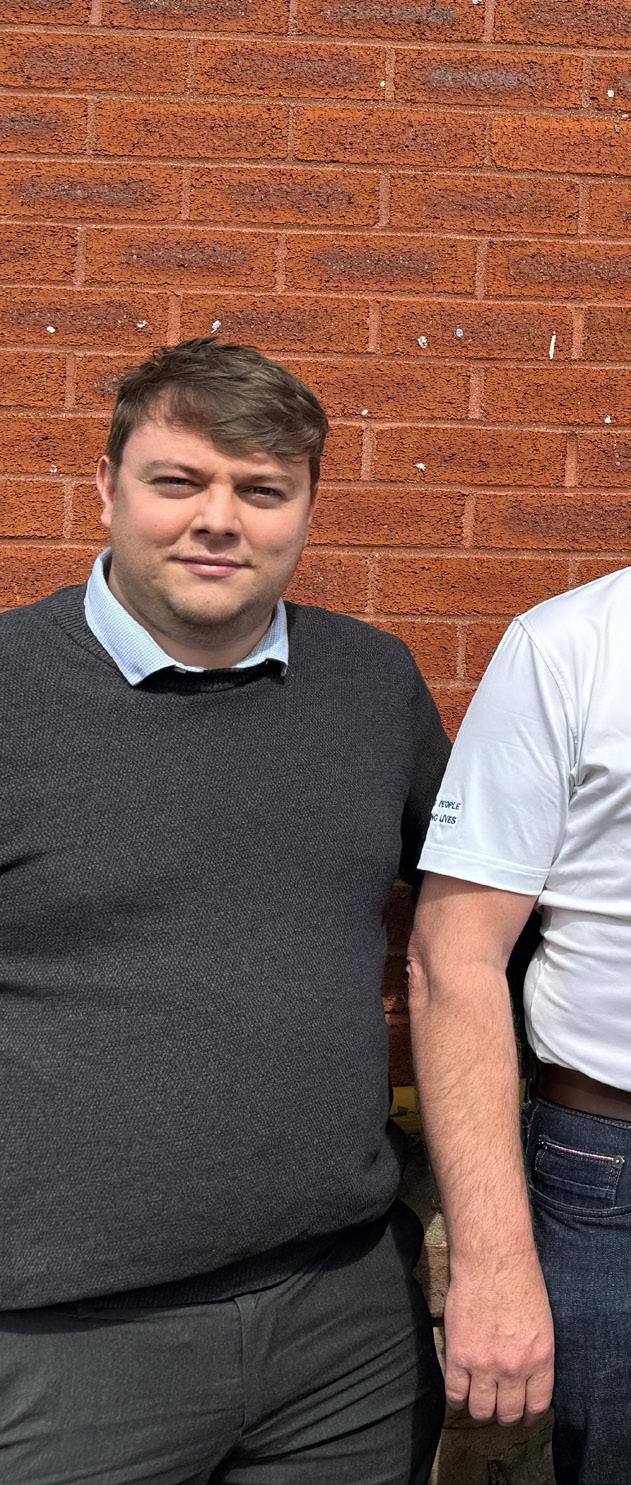

We pride ourselves on being an ethical organisation that takes the long-term view and does the right things for the right reasons. We have a Green Action Group and a Diversity, Equality and Inclusion Action Group, but there is limited involvement from the clinical team in these and their impact is currently limited.
Our Great Western Hearts programme is increasingly using evidence of where the highest needs are to prioritise the location of our public access defibrillators. Our CPR and emergency life support training has started to be delivered to traditionally excluded groups, training over 10,000 people in 2023.
We have been working on plans for renewable energy generation but do not have any in place yet. We have seven charity shops and 62 textile recycling banks that divert goods from landfill. Our vehicles all run on fossil fuels.
Our staff, clinical crew, volunteers, supporters and the former patients we are in contact with do not reflect the diversity of the communities we serve.
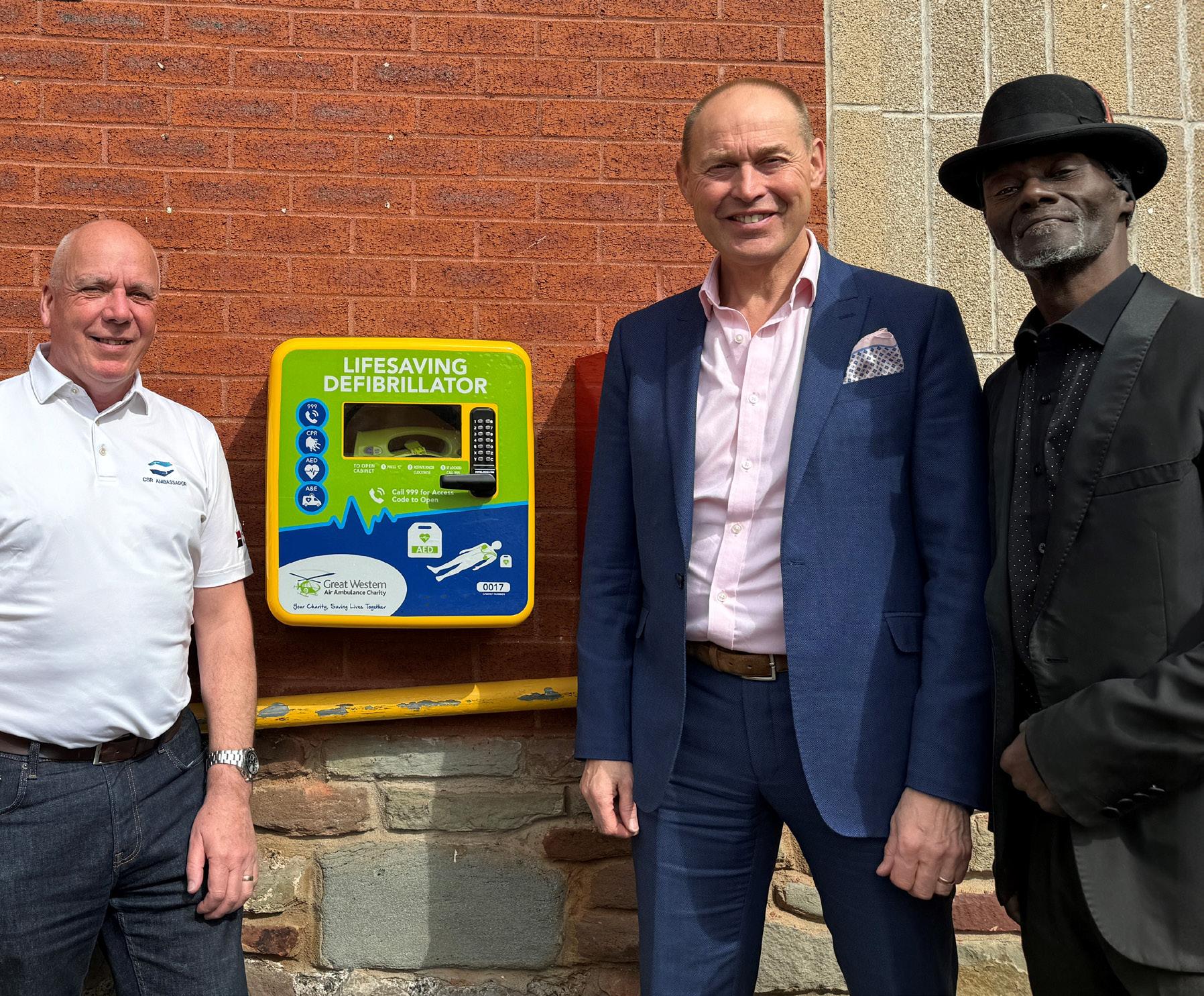
• Reduce our use of fossil fuels and physical resources, make a meaningful contribution to the circular economy, promote biodiversity and generate renewable energy from our land and building assets.
• Work with our communities to strengthen the ‘chain of survival’ –ensuring patients who need it have prompt CPR and defibrillation.
• Understand the diversity of our crew, staff, supporters, volunteers, former patients and bereaved families. Take steps to address any barriers to getting in touch, understanding our work, supporting us, working with us or benefitting from a relationship with us that certain groups may perceive or experience.
• Enhance the support we offer to former patients and bereaved families, to help them recover from the event that led to them receiving our service.
• Enhance the knowledge, understanding, empowerment and action of our crew, staff and volunteers regarding equity and inclusion, health inequalities and environmental sustainability.
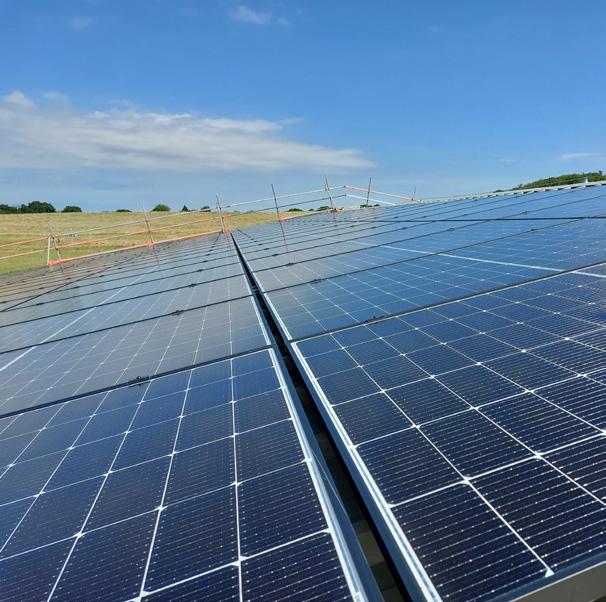
We will have made significant progress towards our goal of becoming carbon neutral by 2030, and be an example for others to follow regarding environmental sustainability.
More people in our region will be surviving cardiac arrests, thanks to our placement of public access defibrillators in locations where they are needed most, and our training of thousands of people in CPR and related skills.
We will reflect the communities that we serve in our non-clinical teams, and have increased diversity in our clinical crew. The principles of equity and inclusion will be embedded in all our work.

Our income is currently around £4.5m per year, but our costs often increase at a faster rate than our income, partly driven by general inflation and cost of living pressures for our supporters. People die or experience poorer outcomes every week because we aren’t there for them –either because our crew were busy elsewhere or because we weren’t operating when they needed us, due to our limited resources.

Our fundraising activities are based on building long term relationships, rather than a short term transactional approach, and are carried out by staff who are driven by our Purpose rather than short term performance targets. This wins us loyalty and positive feedback from our supporters. However, we are not currently generating income at the scale we need, and we know that key sources of income, such as monthly gifts, lottery plays and legacies, are significantly less than those received by other air ambulance charities.
We benefit from over 200 volunteers who carry out a wide variety of tasks each year, but would benefit from increased numbers to complete fundraising activities relatively autonomously, volunteer in our shops, and to support our Great Western Hearts programme.
Our brand is increasingly well recognised and appreciated by our communities, with growing amounts of media interest in our work. However, there is confusion about which air ambulance charity is the primary provider in much of the area we cover, and people often struggle to recall the accurate name of our charity, in part due to us not having an easy to describe geographic area.

• Implement a new database which helps us to automate processes and record information about our supporters and our fundraising performance, and use it to drive improvements.
• Further develop our understanding of what our communities know about air ambulances, what they want to hear from us and what value they want us to add to their lives, then act on it.
• Enhance our visibility, reputation and media presence so that more people are aware of GWAAC, that we need their support and how to support us.
• Review our fundraising programme and put in place a strategy, with appropriate investment, to secure a step change in our income from suitably diverse, sustainable and robust sources.
• Increase our number of regular volunteers, and their ability to carry out income generating and educational activities autonomously.
• Review our fundraising prospectus and activities and ensure they are attractive and accessible to people from diverse backgrounds across all of the communities we serve.
• Become an increasingly integrated part of local communities, demonstrably providing value through shops, defibrillators, CPR training, education, events, recycling options, support for former patients and bereaved families, and a lifesaving service to the people we serve.
• Increase our income from trading and related activities, such as retail, recycling and renewable energy.

Our overall income will be sufficient for us to deliver our Ambitions, growing year on year. The majority of this is unrestricted funding, and our non-legacy income is sufficient to cover our annual running costs, leaving legacy income for capital projects and other investment.
We will spend proportionately less on generating funds due to working more efficiently and at scale, and due to more local people proactively seeking us out and choosing to support us. Our supporters continue to recognise the value of our work and their relationship with us, and increasing numbers of people volunteer and trust us with a gift in their will, meaning legacy income reliably exceeds £2m per year.


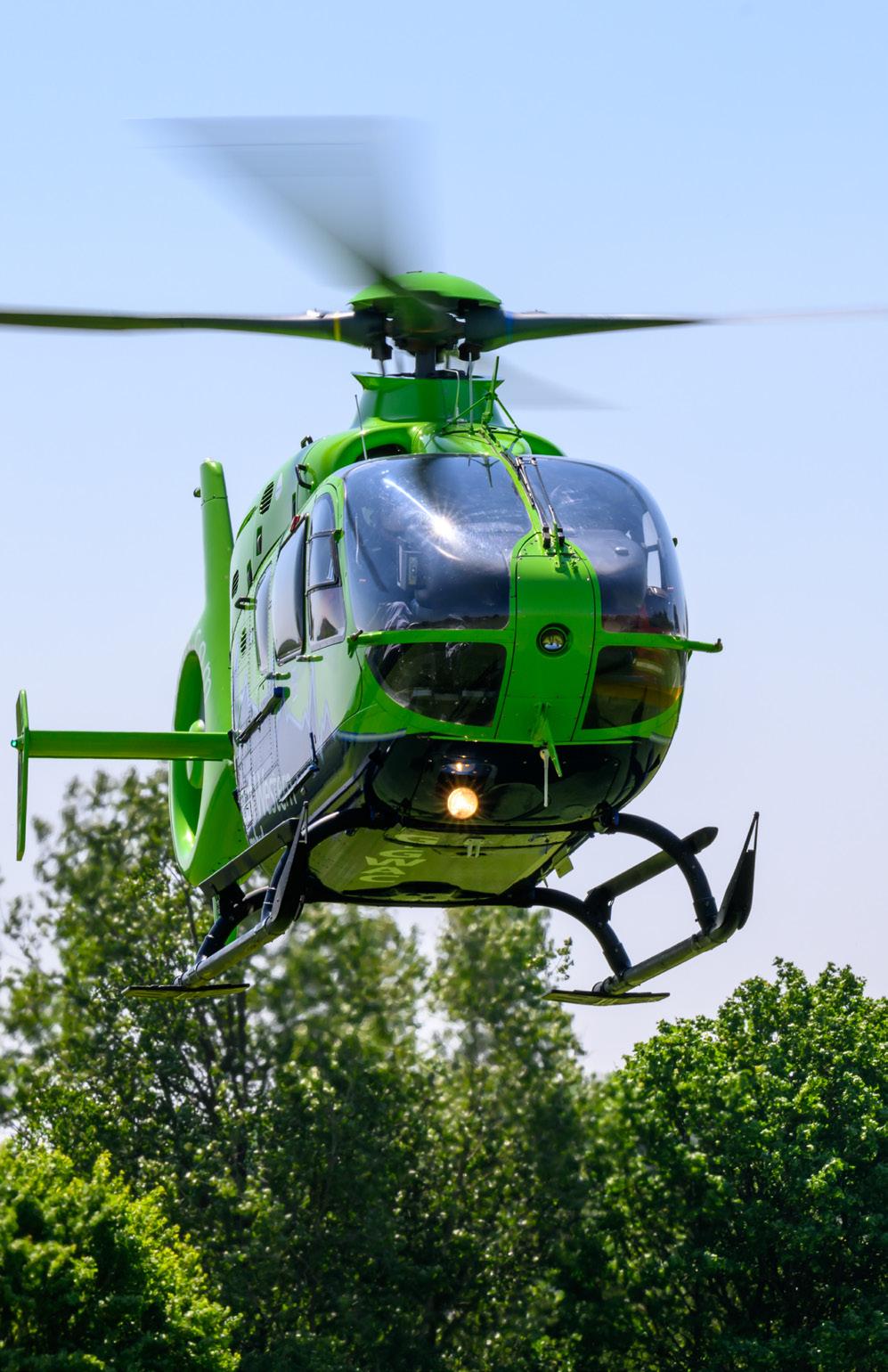
Most of our processes are well-suited to a small to medium sized organisation, but some lack the sophistication that we already require, and we rely too much on people’s knowledge rather than documented, easily accessible and understood processes. Generally our systems and processes will not be sufficient for a charity of the size we aspire to be. We have tasks that don’t fit well with any individual or team’s functions, and lack project management resource.
Despite this, we pride ourselves on always delivering an excellent and professional service across everything we do, thanks to the flexibility and resourcefulness of our staff team. The number of operational missions we carry out is extremely high in proportion to our income, and overall we provide excellent value for money for our supporters and funders.
Our Board of Trustees includes experts from many of the areas that are key to GWAAC’s success, but we lack professional marketing or fundraising Trustees. Our Board does not reflect the communities we serve, with members coming from a relatively narrow demographic, which evidence suggests will hinder excellent decision making.

• Increase our focus on evidencebased practices and involvement in research, so that everything we do is either backed up by evidence for its effectiveness or an attempt to learn more through research.
• Improve our income and cost management practices to increase Gift Aid, generate good returns on ethical investments, and provide greater transparency and stability.
• Invest in ICT, including use of artificial intelligence tools, to increase our resilience, efficiency and effectiveness, including through better understanding of our data.
• Collaborate and share more with other air ambulance charities and organisations with shared objectives in order to have a bigger impact with our joint resources.
• Increase the diversity of our Trustees in terms of skills, networks, knowledge, expertise and life experience.
Our systems and processes will be robust and scalable, enabling us to do more with the same resources and reducing our reliance on informal knowledge. We will be using advanced ICT capabilities to provide better intelligence about what our communities want and need and how we should deliver it, and to deliver an efficient service.
Our Board will be more representative of the communities we serve, bring wider networks for the benefit of GWAAC and others, and include communications, marketing and fundraising expertise as well as other skills.
Underpinning many of our plans for improvement between 2024 and 2028 is the creation of a Mission Support Centre at our Almondsbury airbase. This will be a permanent home for our team, delivering a hub for all of our activities that is welcoming, supports our people and our activities, and provides a platform for future success.
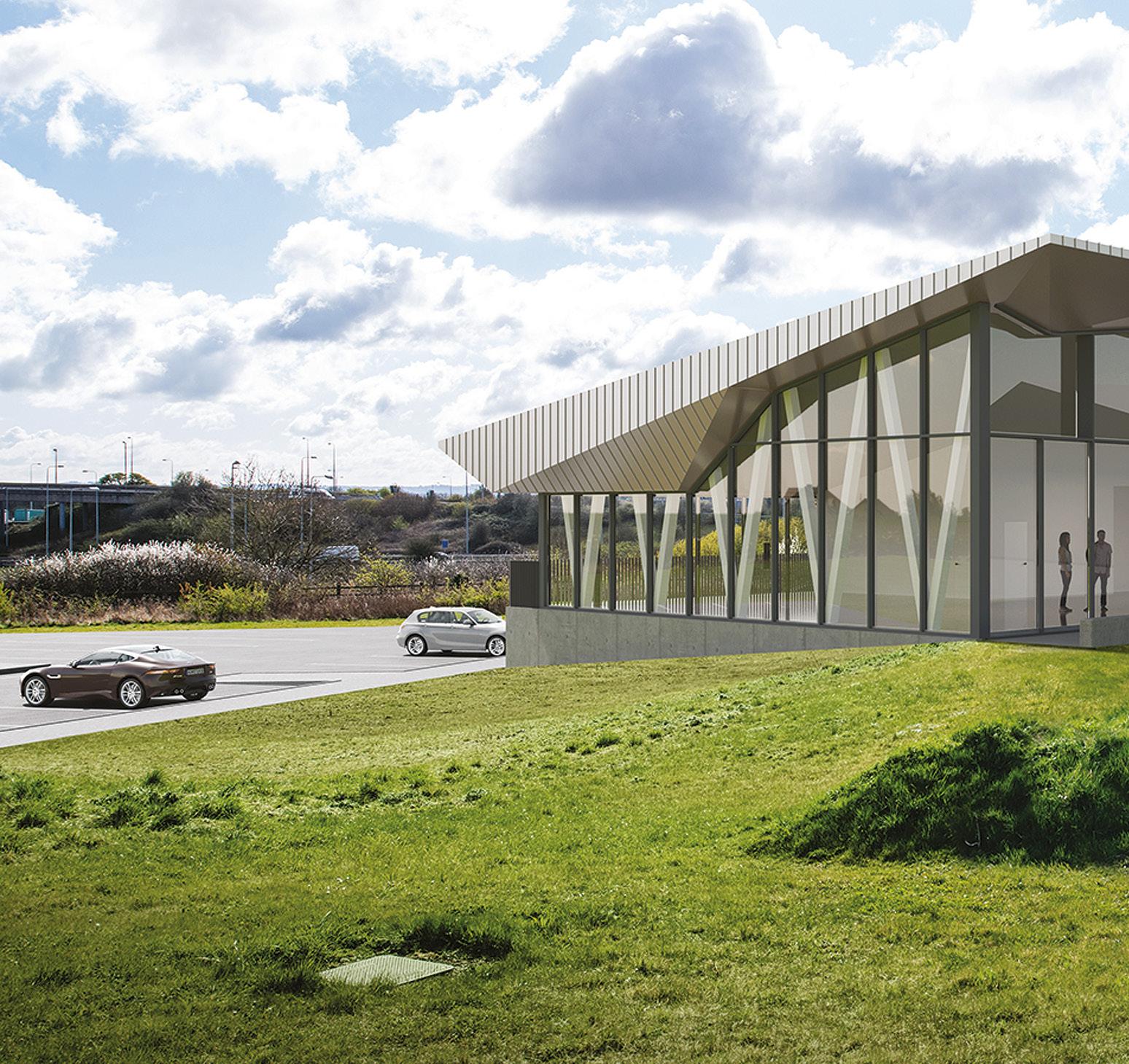
We believe that this Mission Support Centre will:
• Help us deliver clinical and operational excellence, for example through providing space for clinical training and development activities and sleeping pods to enable 24 hours a day working.
• Help our people be the best they can be, supporting their mental and physical wellbeing with a gym, quiet room with natural light, modern office accommodation and rest areas.
• Be environmentally and socially responsible, built with the aim of carbon neutrality in its operation, reducing unnecessary travel by colocating our teams, providing space for CPR training and a welcoming and safe environment for former patients and bereaved families.
• Be a way of engaging more with our communities and helping us raise more money, by enabling us to invite more people to visit us and understand what we do, leading to them choosing to support us.
• Create a permanent home at Almondsbury for our team, helping connect our non-clinical staff to the service we deliver, promoting better communication and co-operation between clinical and other teams, and providing the physical space and resources to enable us to do ever greater things.
We already have planning permission for the building, and have raised over £1.4m million towards its costs.

• Secure the support of additional funders to raise an additional £3 million to fund the capital costs of building the Mission Support Centre.
• Complete the build of the Mission Support Centre.
• Move our office-based team and related activities to Almondsbury.
• Celebrate the opening of the Centre and thank our generous supporters, through a programme of welcome and thank you events.
Our airbase will have the facilities and resources that a mature charity of our size and nature needs in order to work effectively, efficiently and collaboratively. Our clinical and non-clinical teams will be co-located at Almondsbury, working closely together to achieve our shared Ambitions, and able to welcome supporters and stakeholders of all kinds to our home.
Our resources are limited, particularly our funding, and therefore there are some things that we don’t plan to do by 2028. That doesn’t mean we won’t be thinking about them, being alert to opportunities and open to suggestions and offers.
We don’t plan to:
• Buy our own helicopter or add a second one to our fleet
• Replace our helicopter with a larger or more modern model
• Become a registered air operator with the Civil Aviation Authority and run our own helicopter operation
• Become clinically independent from the ambulance service, with our own Care Quality Commission registration
To achieve our Ambitions, there are some things we will need to be excellent at:
• Being guided by our Values and putting them into practice in everything we do
• Being led by evidence, from other organisations and generated internally, on what is and isn’t likely to work
• Monitoring and evaluating everything we do, so we can assess its value and effectiveness, and do better in the future
• Communicating well, with honesty and transparency, internally and externally
• Collaborating with each other, spending time with people from different teams, discussing our plans and activities, introducing new perspectives and creating opportunities for creative discussion and supportive scrutiny
• Being welcoming – of different opinions, of new people from a variety of backgrounds, and of challenges to what we do and how


